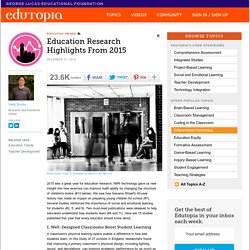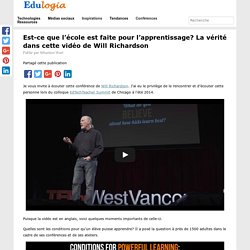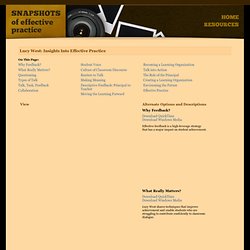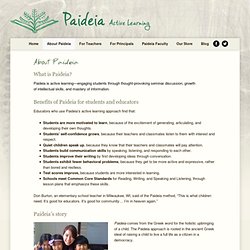

Education Research Highlights From 2015. 2015 was a great year for education research. fMRI technology gave us new insight into how exercise can improve math ability by changing the structure of children's brains (#13 below).

We saw how Sesame Street's 40-year history has made an impact on preparing young children for school (#7). Several studies reinforced the importance of social and emotional learning for students (#2, 5, and 9). Two must-read publications were released to help educators understand how students learn (#4 and 11). Here are 15 studies published this year that every educator should know about. 1. A classroom's physical learning space makes a difference in how well students learn. Barrett, P. 2. Kindness matters. Jones, D. 3. Did you know that participating in theatre programs can help students with autism learn to play in groups, communicate with others, and recognize faces? Corbett, B. 4. If you’re looking for an excellent review of research on how students learn, check out The Science of Learning. 5. 6. Enseignement efficace ou explicite.
Est-ce que l’école est faite pour l’apprentissage? La vérité dans cette vidéo de Will Richardson. Je vous invite à écouter cette conférence de Will Richardson.

J’ai eu le privilège de le rencontrer et d’écouter cette personne lors du colloque EdTechTeacher Summit de Chicago à l’été 2014. Puisque la vidéo est en anglais, voici quelques moments importants de celle-ci. Quelles sont les conditions pour qu’un élève puisse apprendre? Il a posé la question à près de 1500 adultes dans le cadre de ses conférences et de ses ateliers. Selon son sondage : un environnement sécuritaire, un investissement personnel, des applications de la vraie vie, avoir du plaisir, de la signification, un environnement social, des questions intéressantes, un environnement positif, une audience réelle, de la passion, un enseignant mentor, avoir de l’autonomie, des défis, pas de limite de temps.
Personne ne dit que l’apprentissage doit avoir lieu dans une classe standard avec un curriculum fixe, du contrôle et des examens standardisés. Il y a une déconnexion entre les deux. Education Week. "Tuned Out" by Karen Hume. Tom Drummond. The Classroom Experiment (Ep.2) The Classroom Experiment (Ep.1) Regroupement pour l'étude de l'éducation francophone en milieu minoritaire. Garfield Gini-Newman: Critical Thinking as a Way of Teaching Social Studies (Part 1) Lucy West: Insights Into Effective Practice. Lucy West: Insights Into Effective Practice On This Page: What Really Matters?

Download QuickTimeDownload Windows Media Lucy West shares techniques that improve achievement and enable students who are struggling to contribute confidently to classroom dialogue. Types of Talk Download QuickTimeDownload Windows Media Five types of talk exist – rote, recitation, instruction, discussion and dialogue. Talk, Task, Feedback Download QuickTimeDownload Windows Media Oracy development and the importance of cognition as an outcome of discourse are two of the factors that contribute to the successful interconnection of talk, task and feedback. Student Voice Download QuickTimeDownload Windows Media Lucy West outlines how teachers can foster student voice by encouraging them to articulate their reasoning and by valuing their ideas in the classroom.
Culture of Classroom Discourse Download QuickTimeDownload Windows Media What factors are evident in a culture of classroom discourse? Becoming a Learning Organization. Course: Cheryl's Community. The Tempered Radical. Will. Play, passion, purpose: Tony Wagner at TEDxNYED. About Paideia. What is Paideia?

Paideia is active learning—engaging students through thought-provoking seminar discussion, growth of intellectual skills, and mastery of information. Benefits of Paideia for students and educators Educators who use Paideia’s active learning approach find that: Don Burton, an elementary school teacher in Milwaukee, WI, said of the Paideia method, “This is what children need. It’s good for educators. Paideia’s story Paideia comes from the Greek word for the holistic upbringing of a child. The Paideia method was developed in the early 1980s by the philosopher Mortimer Adler. Today, thousands of teachers in hundreds of schools across the United States and other countries use the Paideia method to engage students in active learning. Bring Paideia to your school The Paideia approach can be adapted to all subjects, from kindergarten through high school. Paideia regards both educators and students as lifelong learners.
Candee Forest. Réseau Education et Formation 2013 - Liste des symposiums. Maîtres chercheurs en éducation.